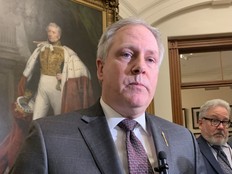No direct relief for people suffering rate shock on NB Power bills
Higgs Tory budget instead provides $50 million to offer several thousand low-income families free heat pumps to help offset electricity bills

Article content
New Brunswick’s budget has no direct relief for households who will suffer rate shock on their electricity bills this year.
With NB Power bills set to go up nearly 13 per cent for households as of April 1, the Higgs Progressive Conservative government didn’t bow to Liberal opposition demands that it cut the provincial portion of HST, or the harmonized sales tax, on those charges.
The provincial portion of the 15 per cent HST charge is 10 per cent and cutting it would have meant households would face only a modest increase.
Instead, according to NB Power’s own numbers, the average household can expect to pay $300 more this year for electricity, subject to approval from the New Brunswick Energy and Utilities Board, during what has been described as an affordability crisis, with groceries, gas, mortgages and rent all climbing markedly.
Finance Minister Ernie Steeves said his Tory government had already provided relief by offering a one-time $300 payment to thousands of workers, launched a few weeks ago.
“For a lot of people, this workers benefit could be direct relief,” he told reporters in Fredericton before delivering the provincial budget Tuesday. “It takes five minutes online to get it done. And it’s 300 dollars, folks, and it’s tax free.”
The benefit is available to anyone who had $3,000 or more in family working income and family net income of $70,000 or less for that taxation year. The cutoff date is June 30 and so far, more than 15,000 people have received the money out of more than 35,000 applications. The payouts have added up to $7 million in relief.
Liberal Opposition Leader Susan Holt said the budget shows that Premier Blaine Higgs doesn’t care about helping people who will be facing higher electricity bills.
She pointed out that the 35,000 applying for one-time $300 in relief was nowhere near the estimated 338,000 households that could face big increases for electricity. And the NB Power hikes will likely be permanent.
“The workers benefit program has been a mess, and trying to even figure out how to get access to that benefit means you have to find a form from Canadian Revenue Agency, and get it submitted, and that’s why the applications have been low,” Holt said. “They are not going to get as many people as they hoped it would, whereas a simple removal of the tax on bills helps everyone instantly without needing 55 civil servants to administer it.”
How much such a measure would cost the province’s bottom line is a point of contention. The Liberals said their promise would cost the treasury $72 million, whereas Energy Minister Mike Holland said it would be closer to $120 million.

To help offset costs for some ratepayers, the Higgs government says it will spend $50 million more on the enhanced energy savings program, which offers free heat pumps, insulation, and crack sealing to low-income households to help them better manage their electricity bills.
This comes on top of Ottawa pledging $20 million to help people in the same program who use primarily oil heat instead of electric baseboards.
NB Power’s CEO welcomed the provincial funding.
“In New Brunswick, rates are amongst the lowest in the country, yet bills are often higher because of our reliance on inefficient baseboard heating,” Lori Clark told Brunswick News in an email. “This funding will help even more New Brunswickers benefit from the enhanced energy savings program, lower their electricity costs and make their homes more comfortable. This is a key part of our longer-term strategy to drive electrification and create greater value for our customers.”
But the big provincial cash injection comes with an asterisk.
Last September, Clark told a legislative committee that $150 million more would have to be spent just to clear people off the waitlist for the program.
With $70 million committed between the feds and the province, there remains an $80-million shortfall.
NB Power’s most recent tally, up to the end of February, showed close to 15,000 households were on the wait list.
Since the program started in September 2022, the province has spent close to $60 million, helping more than 8,000 families and individuals make their homes more energy efficient.
When you consider New Brunswick has 118,000 that meet the household income cutoff threshold of $70,000 of less, you get a sense of the large number of people being left behind, to say nothing of the other 220,000 wealthier households that wouldn’t even qualify for the program.
Green party Leader David Coon said the province should provide landlords with ways to make their apartment buildings more energy efficient, as the poorest households often rent and don’t own their own homes.
Many of those apartments have inefficient baseboard heaters.
“The government is just pretending that these rate increases are not going to have a significant impact on people, especially the most vulnerable, those on fixed incomes, those working minimum wage,” Coon said. “They could have augmented the budget much more to make sure the free insulation and heat pump program was extended to many more households, and put in a requirement for landlords of small apartment buildings to upgrade their insulation and install heat pumps.”
Even if more money was dedicated this budget year between April 1 and March 31, 2025, for the free program, it’s an open question whether NB Power could deliver it to more households.
It was briefly suspended in January 2023 when the utility struggled to put in place contractors to do the job, and finding enough technicians to serve thousands of more households poses difficulties.












Postmedia is committed to maintaining a lively but civil forum for discussion. Please keep comments relevant and respectful. Comments may take up to an hour to appear on the site. You will receive an email if there is a reply to your comment, an update to a thread you follow or if a user you follow comments. Visit our Community Guidelines for more information.